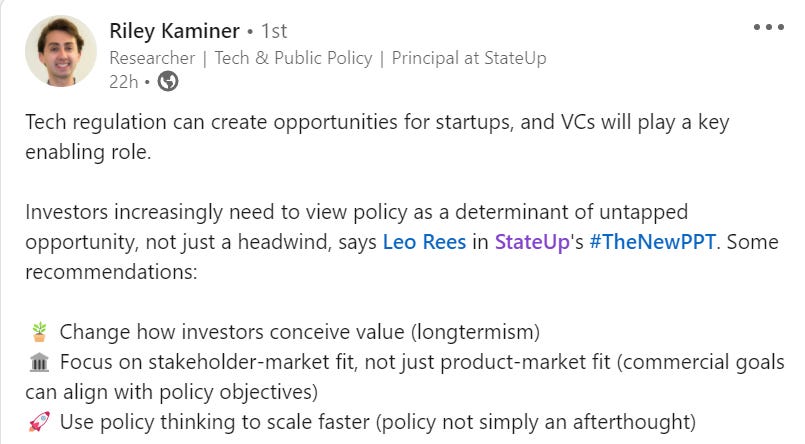Is a new phase of tech regulation changing the odds for VCs?
By Leo Rees, Director, Technology Policy and Strategy, at Milltown Partners LLP
Listen to this post:
There is a common assumption made about VC-backed, fast growth tech companies, which is that they prosper best in territory that is uncharted by regulation, or exploiting gaps in the law. This is based on a supposition that many venture capitalists believe: that innovation and profit generally occurs in spite of regulation, sometimes, begrudgingly, alongside it but not because of it.
However, we are entering a new phase of tech regulation that is pushing and pulling VCs to make bets that are more aligned with public policy goals. This piece explores the regulatory and business environment that will drive more investment in public-purpose technologies, which can deliver against those goals, and how investors might think about adapting to it.
The push: regulation is ‘eating’ more marketplaces.
More tech enabled start-ups are coming under the purview of policy. This is for two reasons:
(1) policy makers are extending regulation’s reach into new markets created by technology. They are increasingly taking an approach where rules orientate around the technology itself rather than focusing on application and output. This is to ensure these rules can keep pace with innovation - e.g. new rules for AI for use cases as diverse as protein folding and autonomous drive.
(2) Concurrently, those same technologies are becoming more diffuse and used in a wider range of sectors, effectively expanding the reach of those rules.
The pull: regulation is creating enormous market opportunity.
The amount of VC money being deployed has never been higher. As a result, there is fiercer competition than ever for good unregulated investment opportunities. By contrast, markets and opportunities where regulation is a key externality, or core determinant of success (e.g. via finite public procurement opportunities), are comparatively underserved by venture capital. The first mover advantage in these regulated markets, coupled with the relative lack of competition, should act as a serious pull factor to VCs looking for outsized returns. Data from Atomico’s most recent State of European tech report suggests that is true (see below). It’s worth considering a few examples of the mammoth potential in spaces where regulation is currently creating markets:
McKinsey estimates the cultivated meat market could reach $25 billion by 2030. Currently there is no regulatory framework that allows consumers to eat it in many jurisdictions.
The global Open Banking market is expected to reach $43.15 billion by 2026. Open Banking tech relies on rules which mandate API access so challengers can compete with traditional financial institutions.
The market for carbon capture technologies, a core part of most Net Zero forecasts, is expected to reach $2 trillion by 2040. There are currently very few subsidy regimes that make investment in carbon capture economically viable.

Adapting to placing bets in regulated markets
To take advantage of this new environment, investors will increasingly need to view policy as a determinant of untapped opportunity, not just a headwind. Here’s three recommendations on how they might do that:
Change how they conceive value: the scale curves and economics of regulated businesses (where compliance or public procurement can be a key determinant of commercial success) or deeptech (where market creation may hinge on state approval or new rules) are different to traditional start-ups. Often, these businesses take longer to reach application and profitability, but when they do, may have a more certain pay-off as policy or procurement can guarantee the growth or returns. VCs would do well to think about how they optimise their capital deployment and return timeline to cater for these growth trajectories, which differ from traditional bets. (Further reading: VCs are gatekeepers to capital. But can they act for the long term?)
Focus on stakeholder-market fit, not just product-market fit: as policy is increasingly a market-maker and breaker for more fast-growth companies, VCs should be focused on ensuring investments fit with the agendas of policy makers and influencers, not just end users. VCs should have a particular eye on businesses whose commercial goals align with policy objectives. This can help to indicate likelihood of success.
Use policy thinking to scale faster: policy is often an afterthought for founders when compared with other competing priorities. But VCs can help founders conceive of policy thinking as a product imperative, rather than an external affairs issue. In particular, good policy support can be instrumental in pushing deeptech and regulated start-ups through the ‘valley of death’ from R&D to application and commercialisation. Practically, this could mean helping early stage companies engage with grant awards, or at a later stage, find applications or public procurement opportunities that have emerged as a result of policy goals.
Feedback:
Select feedback from the last post is available at the bottom of the page here. Tell us what you think about Leo’s post here.









